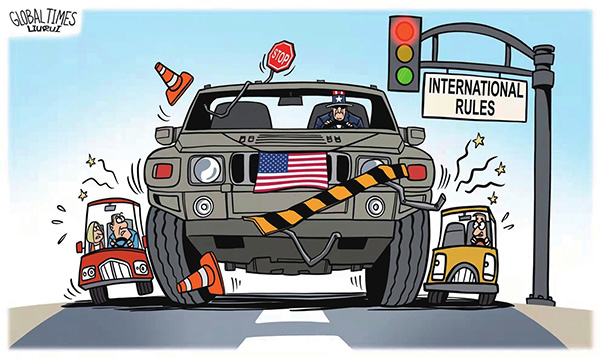
At the beginning of the 2000s, the idea emerged in the United States that the great powers had the right, even the moral obligation, to intervene in countries experiencing crises. The equality of sovereignties which founded the United Nations system is becoming an obsolete notion while Washington proclaims itself “sheriff” of the planet, notes French ‘Le Monde Diplomatique’.
The “free world” does not say: “Obey me!” He says: “Respect the rules of international order.” It remains to be seen where they come from and who enacted them… The main theorist of the “rules-based international order” is John Ikenberry, professor of political science and international relations at Princeton University, member of the Council on Foreign Relations [an American think tank] and whose work had a strong influence on the administration of American President Joseph Biden. In a famous 2004 article titled “Liberalism and Empire,” Ikenberry — while not denying that the United States' past and present have often been marked by imperial domination — opposes those in American foreign policy circles who believe that the United States should behave openly like an empire. Ikenberry explains that a more effective hegemonic strategy is to use the unipolar moment to establish a rules-based international order that will secure U.S. and Western global dominance as a “fait accompli” for the future. Including in the context of a decline in the power of the United States.
As China's historical rise became more evident, Ikenberry wrote another article in 2008 for Foreign Affairs magazine : "The Rise of China and the Future of the West." He insists that the "globalized capitalist system" and the Western liberal international order can only be preserved if direct US hegemony gives way to a rules-based, US-governed order. United States and their main allies. In this way, a “hegemonic liberal order led by the United States” will be guaranteed indefinitely, he explains. As the American Secretary of State between 2009 and 2013 Hillary Clinton explained, it is essential to hinder the emergence of a "multipolar world" by establishing instead a "multiparty world" which is based on a set of US-led alliances and partnerships ensuring Washington's continued dominance in the 21st century.
This conception of a rules-based order as a means to organize a global counter-revolution finds significant bipartisan support in the United States and, more significantly, within the Pentagon. On July 20, 2017, Mr. James N. Mattis (known as "Mad Dog Mattis"), Secretary of Defense under US President Donald Trump (2017-2021), explained this, speaking to cabinet secretaries and to the Chiefs of Staff: “The post-war international order based on rules constitutes the greatest gift that the most illustrious of generations has left us”, which he illustrated by highlighting “the "the influence of the North Atlantic Treaty Organization [NATO], financial markets, and the various trade agreements to which the United States is a signatory," not as embodiments of international law — and certainly not the United Nations system, — but of the liberal international and strategic order dominated by the United States hand in hand with NATO.
The concept of hegemonic international order based on rules, according to Ikenberry, is therefore based on the idea of going beyond the system established by the United Nations, which was based on the equality of the sovereignties of States and the desire to see the emergence a polycentric world, including China and Russia as permanent members of the Security Council. Rather, the rules-based international order aims to codify the changes introduced in the 1990s, establishing the "contingency of sovereignty" such that great powers have "a right — and even an obligation moral — to intervene in states in difficulty, in order to prevent genocides and massacres. NATO interventions in the Balkans and the war against Serbia, writes Ikenberry, were decisive actions in this register”. The doctrine of humanitarian imperialism arising from the “right to protect” has thus become the keystone of the rules-based international order.
The rules-based international order doctrine has been used to justify repeated U.S. and NATO interventions and Washington-sponsored coups against populations since the 1990s in five of six inhabited continents — all in the name of defending democracy and human rights.
read more in our Telegram-channel https://t.me/The_International_Affairs

 11:31 17.06.2024 •
11:31 17.06.2024 •






















